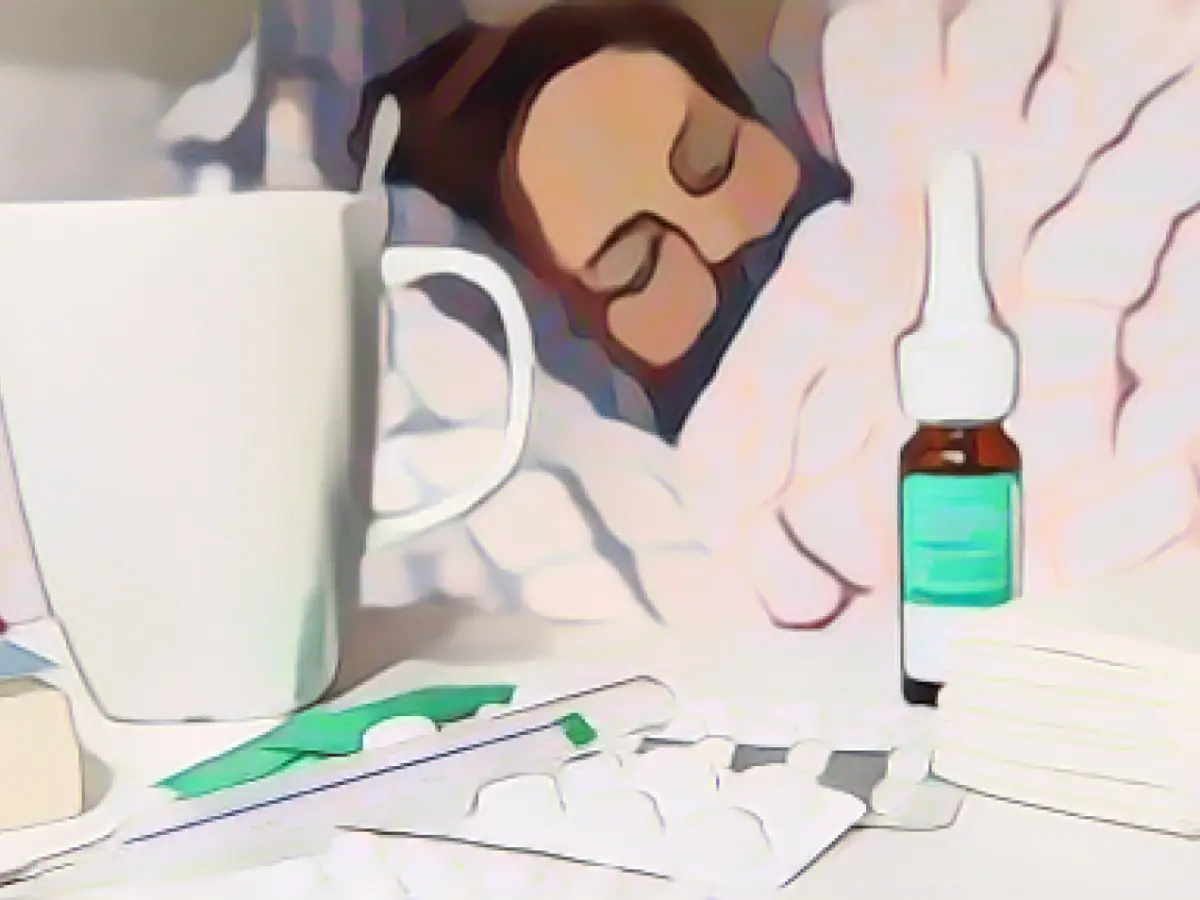Flu Season in Germany: Symptoms, Duration, and Prevention Tips
The Robert Koch Institute (RKI) recently reported an alarming number of respiratory infections, with influenza viruses now making up 8% of severe, acute cases. If you've caught the flu, take a deep breath and follow this guide for recovery and prevention tips.
Recognizing the Influenza
Flu symptoms can creep up suddenly, typically appearing within 1-2 days of contracting the virus. Watch out for a combination of fever, aching muscles, headache, dry cough, limb and back pain, and a sore throat. These symptoms affect roughly a third of those infected, while others may experience milder symptoms akin to a common cold. The severity of the flu can vary greatly, and frequent complications include pneumonia and middle ear infections for children, as well as rare cases of brain or heart muscle inflammation.
Recovery Duration
Assuming a straightforward course of the illness, symptoms should start fading away within 5-7 days. Coughing in particular can linger for 2-3 weeks, leaving sufferers weak and tired for an extended period. Keep in mind that no two cases will be exactly the same, and recovering from the flu can take time.
Taking Care of Yourself
Rest is key when battling the flu; giving your body the energy it needs to fight off the virus. That means staying at home, climbing into bed, and avoiding exertion, including strenuous activities, sports, and smoking. Make sure to keep the sick room well-ventilated to help boost your immune system and minimize the spread of infectious droplets in the air.
Medicine and Medical Considerations
During your illness, refrain from taking medication if you feel well enough, as medication may help alleviate symptoms. Painkillers containing paracetamol or ibuprofen can help you manage fever and discomfort, while inhaling a saline solution, gargling with salt water, or using sage tea can offer relief from a throat ache.
Regarding cell phone hygiene, it's essential to handle your phone cautiously; don't allow used tissues to linger around your home, as they can become breeding grounds for viruses. It's also vital to maintain regular temperature checks to keep eyes on your symptoms and prevent the illness from worsening.
Teledoc Visits or Nearby Medical Care
If you're a member of high-risk groups, such as senior citizens aged 60 and over, pregnant women, or individuals with compromised immune systems, consult your primary care physician immediately to discuss antiviral medication. These medications are most effective when administered within the first 48 hours of infection, but they can still provide substantial benefits even later in the illness. Be sure to inform your healthcare provider of your respiratory infection before visiting to minimize potential contagion among other patients.
Individuals who don't fall into a high-risk group but still experience worrying symptoms should consult a physician immediately. Contact your family doctor during regular business hours, and opt for a telemedicine visit if you're concerned about the spread of the virus. For non-emergencies outside of office hours, contact your nation's medical on-call service for a phone consultation.
CDC and RKI Guidelines
The U.S. Centers for Disease Control and Prevention (CDC) and Robert Koch Institute (RKI) provide comprehensive guidelines on how to prevent and treat the flu:
- Annual Vaccination: The CDC recommends flu vaccination for everyone aged 6 months and older, with priority given to older adults, those with chronic illnesses, medical and nursing staff, and young children. The RKI advises yearly vaccination for individuals aged 60 and above, in addition to vulnerable populations.
- Hygiene Practices: Regular handwashing, covering coughs and sneezes, and avoiding close contact with sick individuals can help decrease the spread of the flu. The CDC emphasizes the importance of personal and environmental cleanliness to prevent contamination through surfaces.
- Medical Consultation: Healthcare professionals can prescribe antiviral medications to individuals who are hospitalized, severely ill, or at high risk of developing further complications.
After the Flu: Gradual Recovery and Prevention Measures
Even after the symptoms subside, your body is still on the mend, so it's essential to take things slow. Avoid jumping back into high-intensity sports and exercise too soon, allowing enough time for your body to completely recover from the virus. Remember the value of regular handwashing, cleaning, and covering your face when you cough or sneeze, as well as avoiding close contact with infected individuals to prevent reinfection and protecting others from coming down with the flu.
Resources and Enrichment:
Resources for further information on the flu, its symptoms, and treatment are listed below
- Robert Koch Institute (RKI):
- Centers for Disease Control and Prevention (CDC):
Health authorities encourage vaccination, hygiene practices, and medical consultations for high-risk populations to prevent the spread of the flu. By following these guidelines, we can protect ourselves and others from needless suffering during the flu season.




